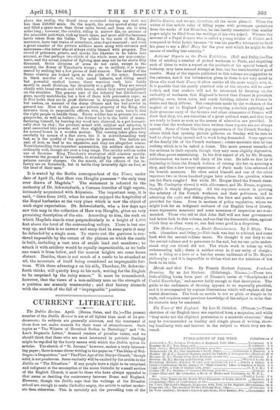Artizans' Reports on the Paris Exhibition. (Bell and Daldy.) — The idea
of sending a number of picked workmen to Paris, and requiring each of them to write a report on the products of his special branch of industry, may have seemed strange at first, but has been fruitful of good results. Many of the reports published in this volume are suggestive in the extreme, and if the information given in them is not very novel to those who read their Times, it often carries all the more weight with it, It is possible that the purely practical side of the reports will be over- looked, and that readers will not be interested by learning on the authority of workmen that England is better than France in porcelain painting, saws, terra cotta, and coach building, inferior to France in chairs and fancy ribbons. But complaints made by the workmen of the neglect of art in England (always excepting porcelain painting), and their generous envy of the bronzes and other ornaments of France, will show that they, too, are conscious of a groat national want, and that they are ready to learn as soon as the means of education are provided. It is true that the workmen who have written these reports are not always agreed. Some of them like the gay appearance of the French Sunday ; others think that opening picture galleries on Sunday will be sure to lead to shops being opened and to work being demanded. Some approve of the family life of the French workman ; others maintain that he has nothing which is to be called a home. The more general remarks of the artizans in their reports, though they may seem slightly digressive, will often prove entertaining. In the first report of all, by Mr. Hooper, cabinetmaker, we have a full diary of his tour. He tells us that he is beginning to learn the French fashion of raising the hat on entering a shop, and that a few hours' experience of Paris made him ashamed of his boorish manners. He often asked himself, and one of the other reporters two or three hundred pages later echoes the question, where are the Paris roughs ? But while Mr. Hooper liked the French danc- ing, Mr. Coningsby viewed it with abhorrence, and Mr. Evans, engineer, thought it simply disgusting. All the reporters concur in praising the sobriety of the French workmen and their politeness, and in admiring the cafes and dining-places, the fairs and parks which are provided for them. Even in matters of police regulation, where we might look for an indignant outburst of our English love of liberty, some repressive measures and some measures of inspection are com- mended. Those who tell us that John Bull will not bear government had better look to this volume, and see that the democratic class, against which they so often warn us, can find some good in a despotism.


































 Previous page
Previous page